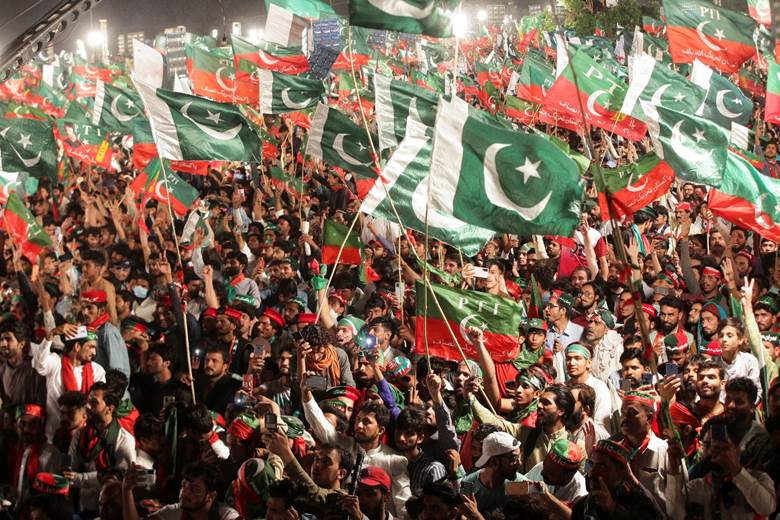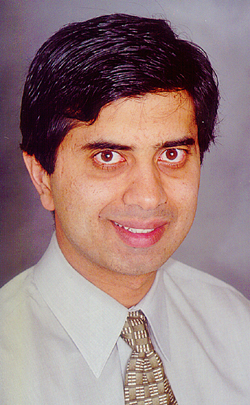
The PTI is more than just a personal vehicle for Imran Khan. Even if he were to die or be killed, the PTI would still attract the greatest support in the country. The military may be able to cook the books this time, but democracy has come to Pakistan and will entrench itself. This is an incredibly hopeful moment for a country of 230 million people- Photo Reuters
Wow! Pakistan’s Political Earthquake
By Nayyer Ali MD

Two years after arcane political maneuvers pushed Imran Khan out of power to be replaced by a bizarre coalition of the PML-N, PPP, and other smaller parties, Pakistan finally held long-delayed elections. Despite the military and the political parties opposed to Khan and the PTI blatantly rigged the playing field against him, Khan won a resounding election victory. But in Pakistan nothing is so simple. Despite the voters solidly backing the PTI and Khan, the military and the traditional parties are pulling out all the stops to block a PTI government. What happens next is very hard to predict and the situation remains fluid.
Khan first came to power in 2018, and the opposition parties repeatedly charged that he only won that election due to the military backing him. Khan was, in their words, “selected” and not “elected”. Khan remained in power till the spring of 2022 when he found himself in conflict with the military, and they responded by engineering a vote of “no confidence” in the Parliament which pushed him out of the Prime Minister’s seat.
In normal countries, once a government loses a no-confidence motion, the next step is elections for the people to choose who should hold power. But in Pakistan, the military and the PDM (the term for the alliance of parties put together by the army to take down Khan) refused elections and simply held on to power for the last two years, well after new elections should have been held.
The PDM accused Khan’s government of being incompetent and doing a terrible job of running Pakistan. But in reality, Khan’s government performed quite well. When they came into power the country was facing a balance of payments crisis and needed an IMF bailout, and Khan negotiated that. Once the economy appeared to be stabilizing following badly needed reforms like an independent central bank and a floating exchange rate, Pakistan got hit like everyone else with COVID and its disruptions. But after the pandemic subsided Khan’s government oversaw the two best years of economic growth in Pakistan in the last 15 years during fiscal 2022 and fiscal 2023. Compared to India, Pakistan’s economy between 2018 and June 2022 grew faster, despite all its headwinds. The main complaint many had was that inflation was running rather high at about 7-12% per year. On the other hand, remittances surged, the current account was near balance, and exports rose sharply after basically being moribund under the previous five years of PMLN rule under Nawaz Sharif.
It is amusing to note that the PDM’s main complaint about Khan was inflation, but once they got into power the inflation rate totally exploded and rose to 30% per year for almost the last two years. Remittances also declined, and exports fell. There were even some who thought Pakistan would default on its debts, a disastrous outcome. Fortunately, that was avoided.
The military and PDM knew they would eventually have to have an election, and they decided to do everything possible to ensure that the Khan and the PTI would be prevented from returning to power. Not only was there an assassination attempt where Khan suffered a bullet wound, the PDM government arrested Khan on trumped-up charges of corruption and revealing state secrets. Khan found himself in jail and forbidden from campaigning. In fact, the PDM government made it illegal for the media to even mention his name. Meanwhile, the PTI party was essentially banned. Khan could have easily accepted exile and a comfortable retirement in London if he was willing to retreat from politics, but he defied the military and the PDM. The PTI could not field candidates under its own banner so it came up with a clever workaround, with candidates running for election in local districts as “independents” but it being obvious that they were PTI candidates.
The military and PDM were overconfident that their tricks and pre-poll rigging would ensure that the PTI would lose, they went ahead with the vote. But the people of Pakistan refused to play along. When the votes started to be counted it became very clear that the PTI was heading for a landslide win on track to pick up 180 out of 266 seats in the National Assembly. The PML-N, the backbone of the army’s scheme to “manage” democracy was wiped out, with some reports that they only won 15 seats. The leader of the PML-N, Nawaz Sharif, who had been pardoned of his previous corruption charges and allowed to return to Pakistan and run for Parliament, was apparently defeated by a woman candidate put up by the PTI who was actually imprisoned at the time.
The Khan landslide was based on a massive youth and urban vote, in addition to doing extremely well in KPK, as Khan’s Pathan background made him favored on ethnic terms. This political shocker was too much for the military. They responded by shutting down cell phone service and internet across Pakistan. They then stopped reporting election results and maneuvered to stuff the ballot boxes across Pakistan to alter the results. But their methods were so crude and blatant that they have been backfiring. In Pakistani elections each precinct reports it hand count of votes in what is called “Form 45”, and those are compiled to yield a final “Form 47” that states the winner of each district. The military was simply altering the Form 47 without changing the underlying Form 45s submitted. Once these were compared it was clear that massive rigging was going on, that was obvious and ridiculous.
At this point, the PTI is going to the courts with the Form 45s and trying to get the rigged Form 47 results tossed out and rectified. Meanwhile, some candidates from losing parties have had the integrity to admit their defeats, while others are latching on to their rigged victories. The military is also responding by trying to break the unity of the PTI candidates. Because they ran technically as independents, they don’t actually belong to any party, and with a mix of enough pressure and bribes, perhaps they can be forced to join one of the PDM parties that the military prefers. The situation in Pakistan remains murky, and who actually will form the next government and how much real power they will have is uncertain.
The US and EU need to stand up for the people of Pakistan and not accept a government that is the result of a rigged election. This kind of outside pressure can be quite powerful, especially if the US makes clear that the IMF will not bail out an illegitimate Pakistani government.
Whether Imran Khan returns to the Prime Minister's office or not is uncertain. But what is certain is that Pakistanis have had a political awakening. The people of Pakistan want democracy and want the right to choose their government. There has been a massive social change in the last 25 years. When Musharraf seized power in a military coup from Nawaz Sharif no less in 1998, there were no tears shed for democracy. Most in Pakistan supported the coup and military rule. Benazir Bhutto and her PPP party workers handed out sweets in celebration of the coup. But Pakistan today is a much more developed society than it was in 1997. The educated youth and urban middle class are demanding the right to decide the direction of Pakistan. The military is no longer held in the high regard it was in 1997.
The PTI is more than just a personal vehicle for Imran Khan. Even if he were to die or be killed, the PTI would still attract the greatest support in the country. The military may be able to cook the books this time, but democracy has come to Pakistan and will entrench itself. This is an incredibly hopeful moment for a country of 230 million people.

